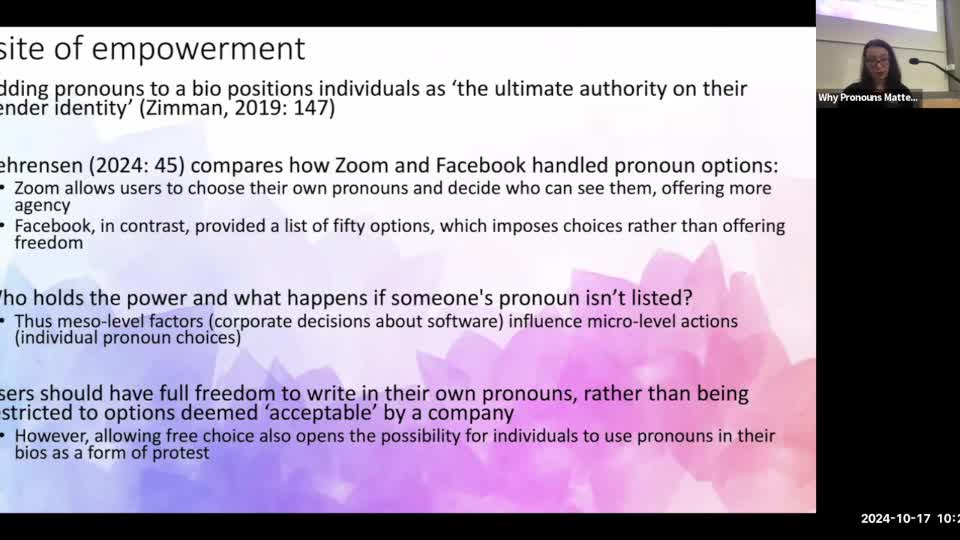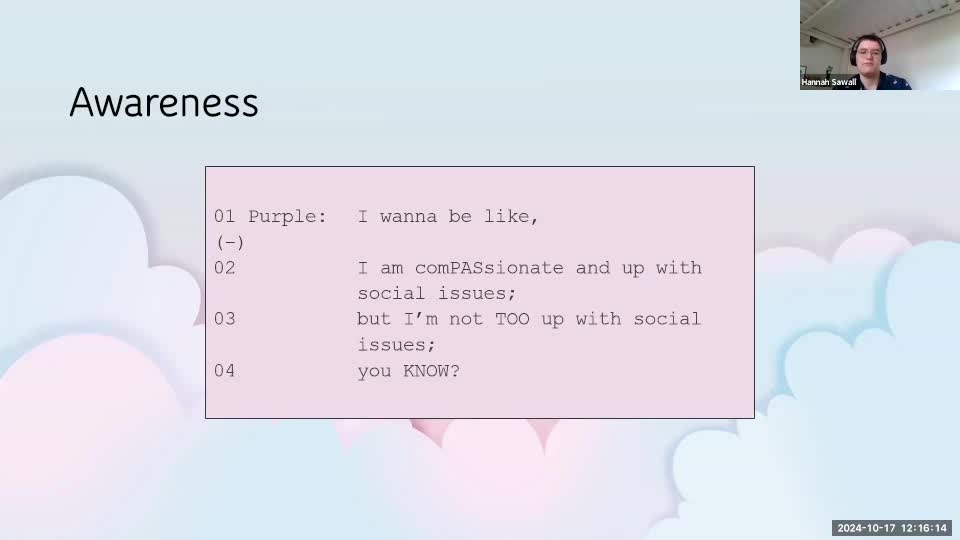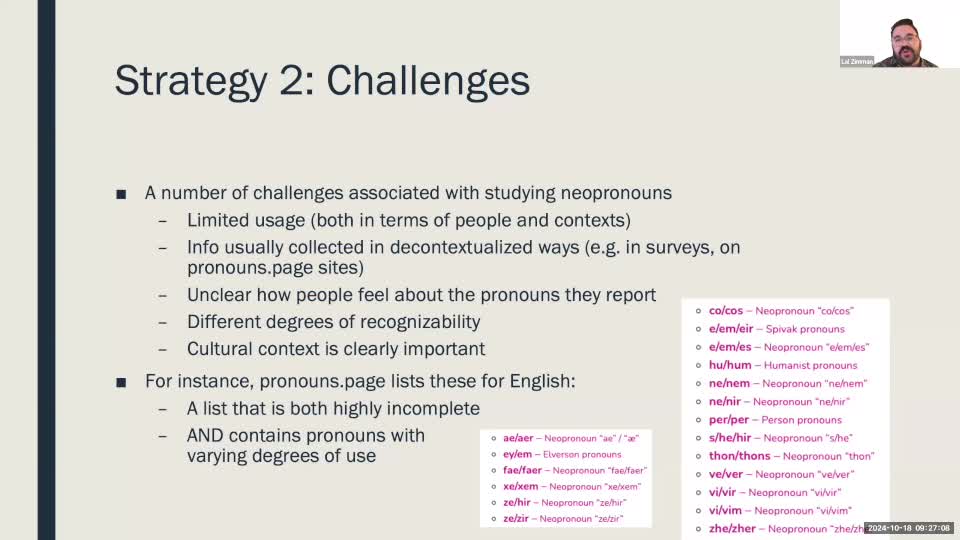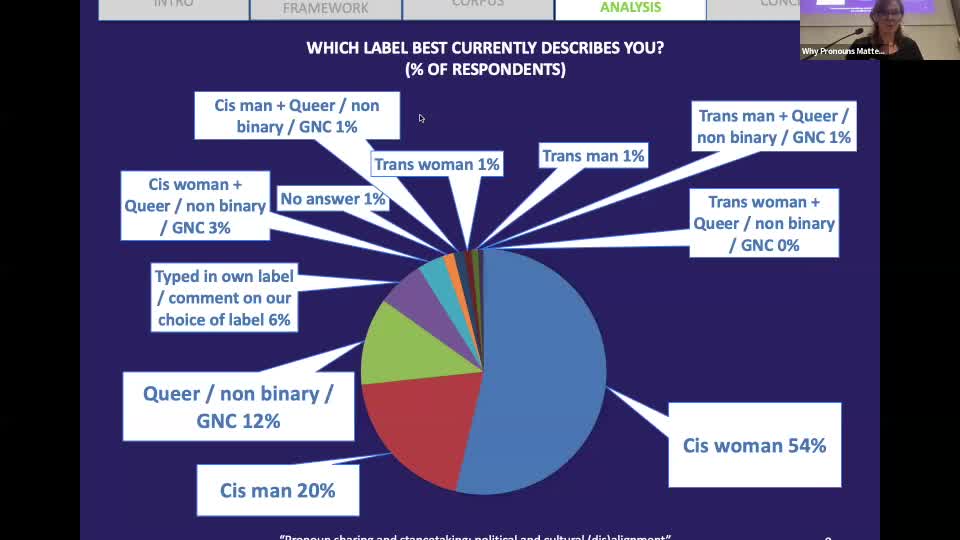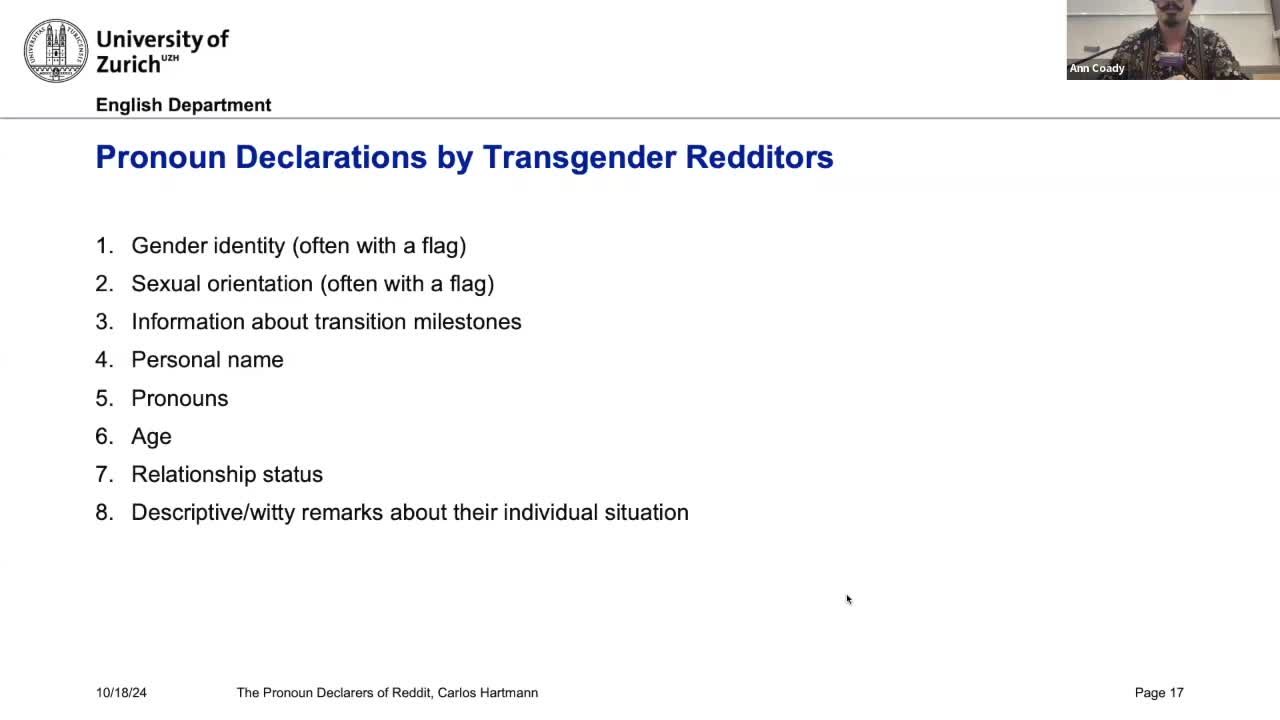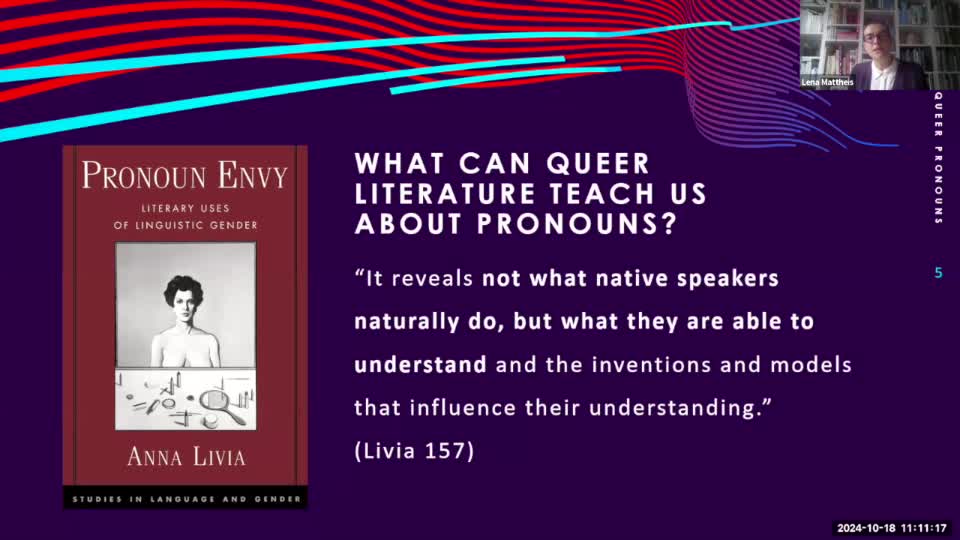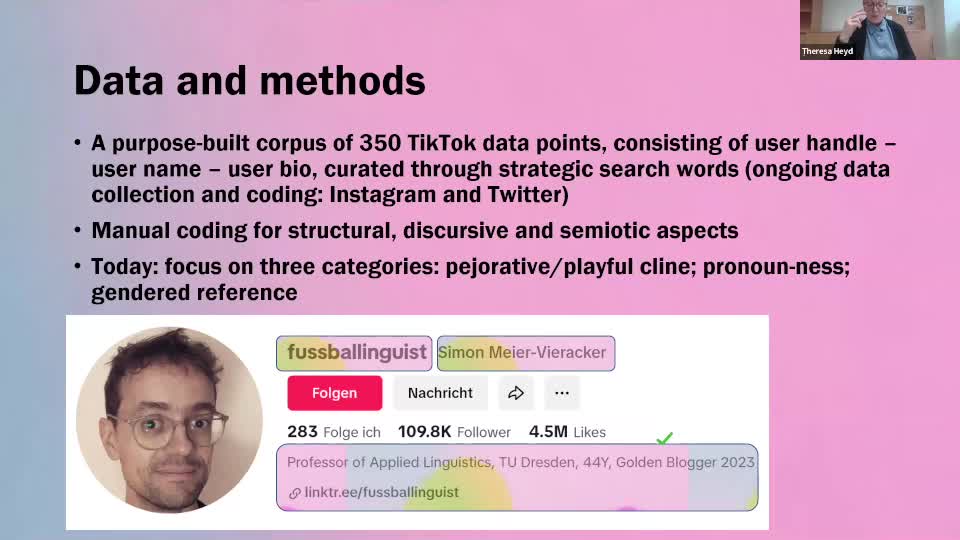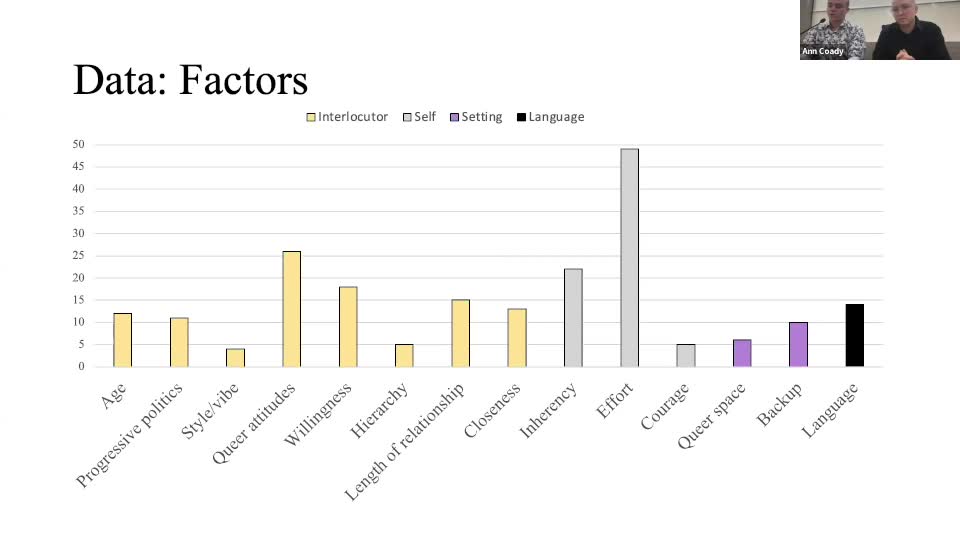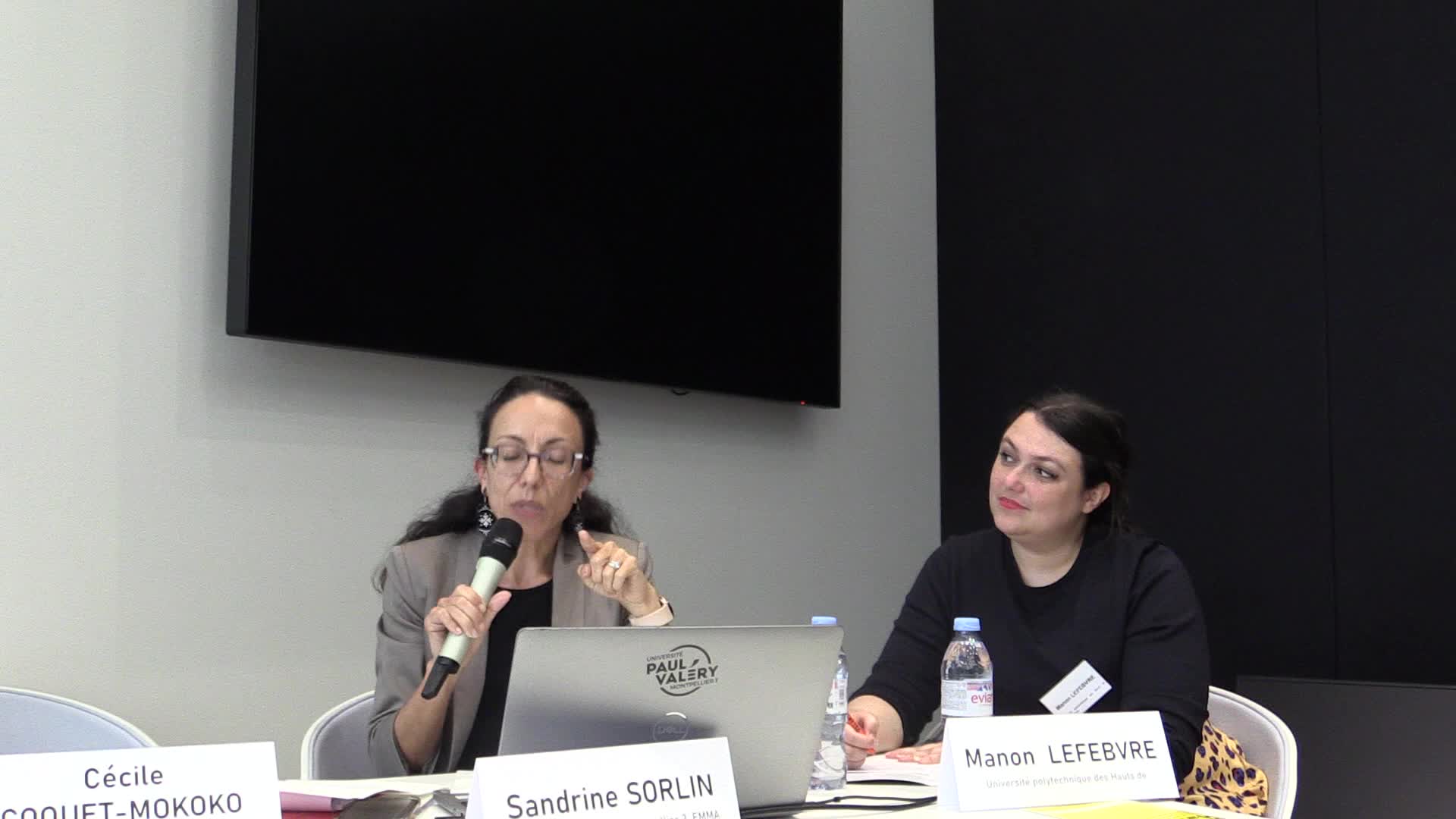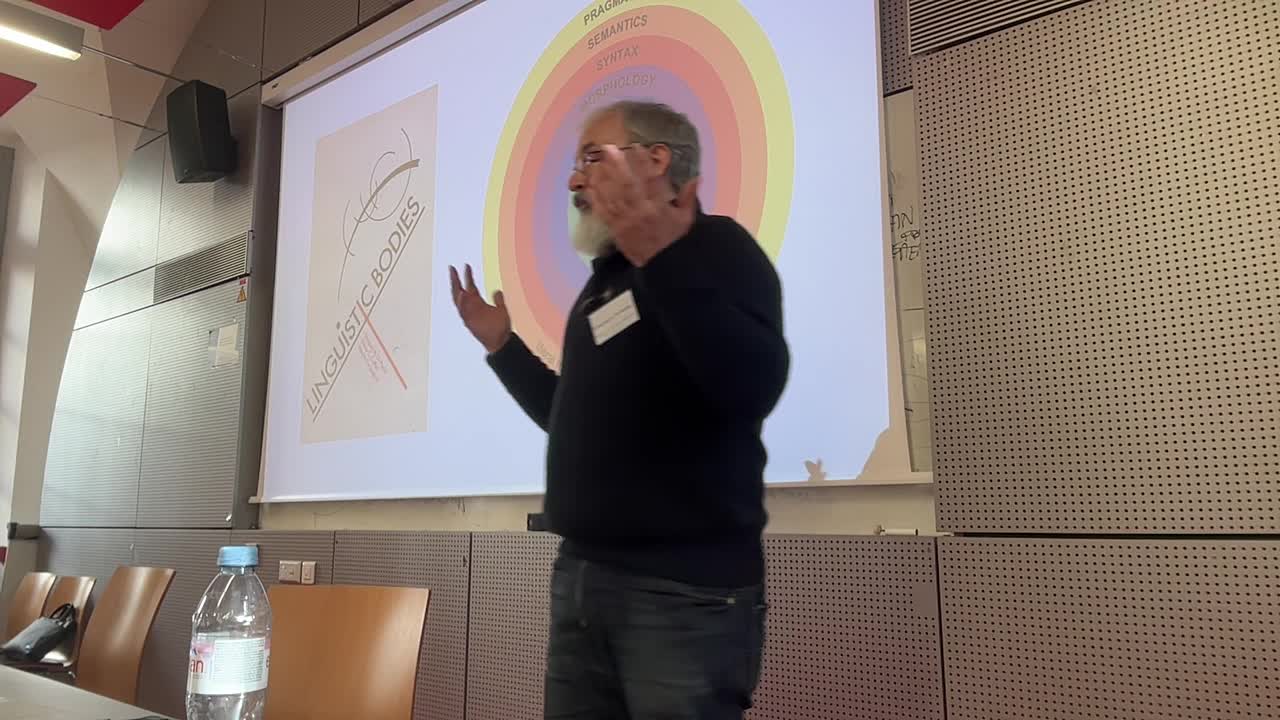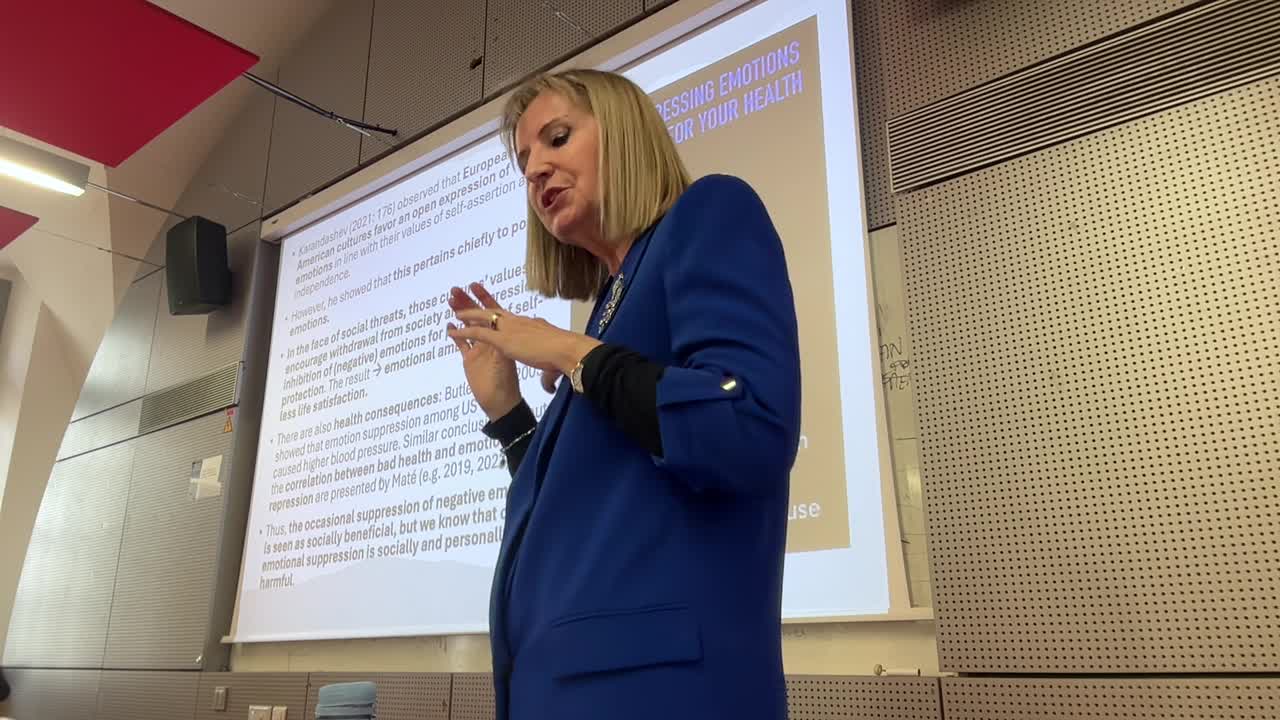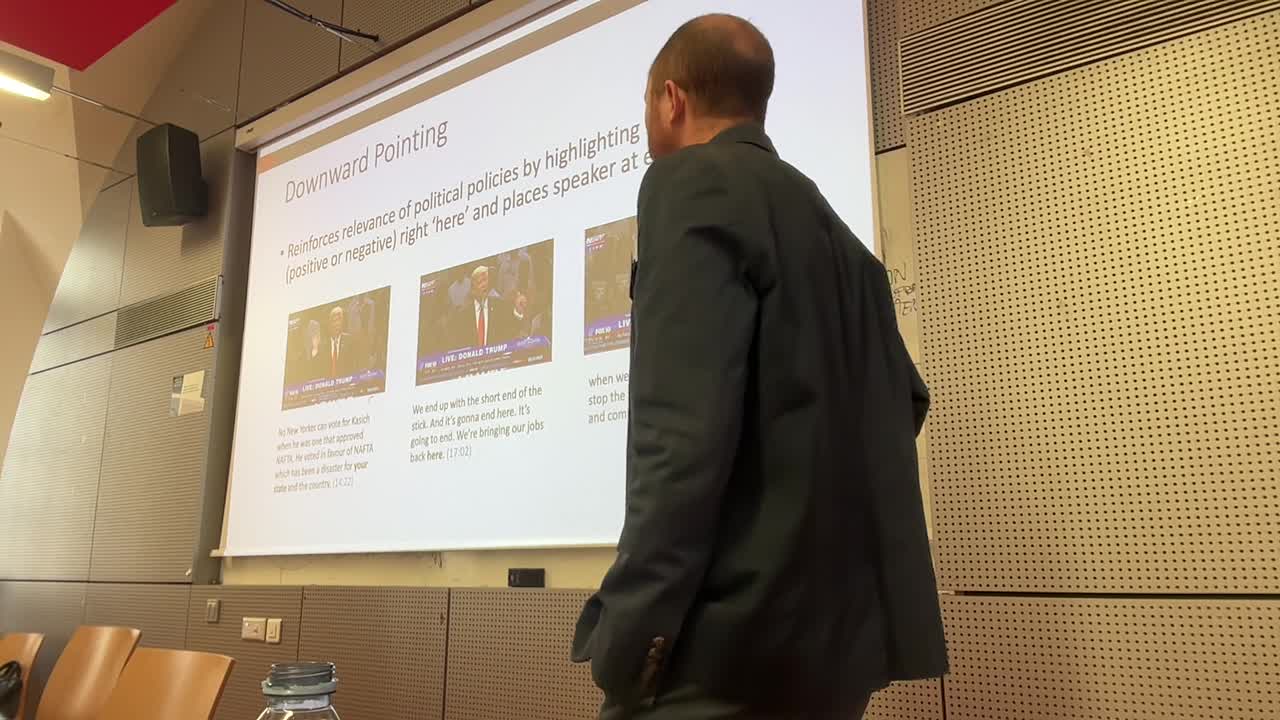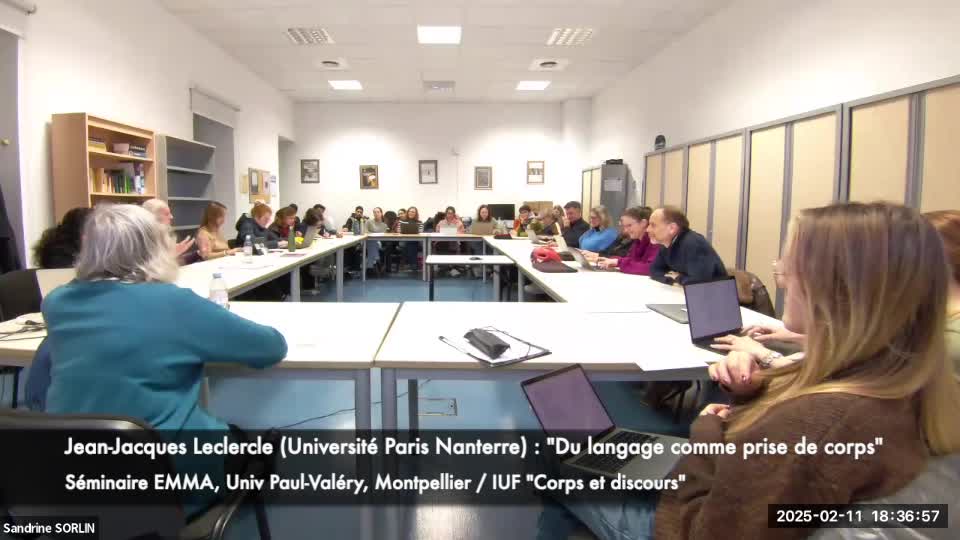Notice
“What’s in a pronoun and how does it matter?: From the perspective of pragmatics”, Sandrine Sorlin, Université Paul-Valéry/IUF, France
- document 1 document 2 document 3
- niveau 1 niveau 2 niveau 3
Descriptif
In this talk, I first wish to give a quick overview of the quite recent ‘pronoun sharing’ trend from a linguistic and pragmatic perspective, going through the new collocations and semantic shifts of the term 'pronoun’ with examples drawn from SketchEngine and from X. I also try to account for the ‘indirectness’ of the use of the third-person pronoun mentioned after a speaker’s name so that people can refer to them in their absence. I then go on to analysing more than 800 responses to a questionnaire designed to assess people’s motivations for pronoun sharing or non-sharing. Elaborating on the sociological concept of “indexicality”, “abstraction” and “stance-taking” (Silverstein 2003, Conrod 2019 Kiesling 2022), I study the responses through a pragmatic filter that allows me to gather all of them under the same theoretical banner, explaining why pronoun sharing matters to some and why others are more reluctant or entirely averse to the practice. I indeed categorise the sharing and non-sharing respondents into different kinds and subcategories in terms of face work (Goffman, 1967), equity rights (Spencer-Oatey, 2002) and (im)politeness (Leech 2014, Culpeper 2011). I isolate a third category that I call the “rejecters” disregarding the practice altogether for reasons linked to their negative face and strict adherence to pragmatic maxims. For the rejecters, “abstraction” consists in packing the sharers into an ideological box from which they clearly wish to disalign with.
Intervention / Responsable scientifique
Thème
Dans la même collection
-
“Pronouns in bio: A site of empowerment, validation, struggle, performance, distraction, and corpor…
Pronouns in bio: A site of empowerment, validation, struggle, performance, distraction, and corporate rainbow washing?
-
“Epistemology and sharing one’s pronouns: First, second, or third-person knowledge?”, Alexandra Gil…
In this paper, I consider sharing one’s pronouns as an act that asserts self-knowledge and positions oneself in relation to an addressee and a shared social landscape: see me this way, interact with
-
““Mein Name ist Lena und meine Pronomen sind she/her”: Exploring Indexicalities of Pronoun Sharing …
Since pronoun sharing has been associated with different political stances from virtue signaling to trans liberation, it is clear that they transport more information than simply how a person asks to
-
"Pronouns, positionality, and power: Institutionalized transphobia, intersectionality and trans-aff…
ZimmanLalThis talk explores the complex role of pronouns in the negotiation of (socio)linguistic justice, leading to the argument that the success of trans-affirming language depends on a broader
-
““Wait, what are your pronouns, sorry?”: Conversation analysis of pronoun requests in comedians’ cr…
Comedians on TikTok frequently show videos of their crowd work, where they ask questions to the attendees. While this is not part of their structured stand-up, it allows for spontaneous interaction
-
“Pronoun sharing and stancetaking: political and cultural (dis)alignment”, Ann Coady, Université Pa…
I begin my presentation by putting current pronoun-sharing practices in political and theoretical context, briefly discussing the current political debate surrounding these practices and comparing
-
“A sociolinguistic case study on the Pronoun Declarers of Reddit”, Carlos Hartmann, Universität Zür…
For this study, I extracted and analyzed Reddit comments featuring pronoun declarations within their user flairs, the optional descriptors displayed alongside usernames. The goal was to identify a
-
“Gendernonconforming Pronouns in Literature”, Lena Mattheis, University of Surrey, UK
Queerly reshaped pronouns, forms and narrative strategies are flourishing in contemporary non-binary, trans and queer literature. From singular ‘they’ to ‘it’ to neopronouns to the collective voice of
-
“Mock pronouns”, Theresa Heyd, Universität Heidelberg, Germany
HeydTheresaThis paper gives an account of mock pronouns as a (predominantly digital) discursive practice. The rise of pronouns and pronominal discourse as a gender-inclusive practice has been accompanied by
-
““What’s a she/they?”: An (auto)ethnographic exploration of epistemic justice and the double bind o…
In this paper, I combine autoethnographic reflections with an exploration of epistemic injustice (e.g. Berenstain, 2016; Davis, 2016; Fricker, 2007; Pohlhaus, 2014) to consider how the persistent
-
“Pronouns, past struggles, new practices: political continuity or radical change?”, Claudine Raynau…
RaynaudClaudineI would like to compare two second wave French feminists’ thought and LGBTQIA+ theorizing and practice regarding pronouns and ponder their possible interactions. My focus will be the work of Luce
-
“Pronouns in Motion: Pronoun variability among Swiss non-binary individuals”, Justyna King and Elij…
Our paper aims to explore pronoun practices and flexibility among Swiss non-binary individuals, by elucidating the factors influencing the pronoun usage of Swiss non-binary people, discerning the
Avec les mêmes intervenants et intervenantes
-
“Focus versus Denial: A pragma-linguistic analysis of the Black Lives Matter and All Lives Matter s…
SorlinSandrine“Focus versus Denial: A pragma-linguistic analysis of the Black Lives Matter and All Lives Matter slogans”
-
Marco Caracciolo: Rhythm and Scalar Levels in Reading Fiction
CaraccioloMarcoSorlinSandrineMarco Caracciolo, Rythme et niveaux scalaires dans la lecture de fiction. Intervention au sein du séminaire de recherche des Études Montpelliéraines du Monde Anglophone (EMMA, Université Montpellier 3
Sur le même thème
-
The historicity of linguistic bodies
Di PaoloEzequiel A.In this talk, I overview the broad assumptions and central ideas of the enactive approach to language, sketch the dialectical methodology that enables us to move from broad forms of participatory
-
"I’ll never call him dad again": Emotional inferences and embodiment in the Giselle Pélicot sexual …
Alba-JuezLauraThis talk presents a sociopragmatic analysis of the inferences and emotional embodiment that emerge in an interview conducted by Oprah Winfrey with Caroline Darian, daughter of Giselle Pélicot, a
-
The Embodied Performance of Right-Wing Populism
HartChristopherIn this talk, I draw on frameworks for the study of co-speech gesture developed in cognitive linguistics (e.g. Cienki 2022) to discuss the forms and functions of pointing and shrugging gestures in the
-
Entretien avec Ariane Mak autour de son ouvrage En guerre et en grève. Enquêtes dans les cités mini…
MakArianeDe 1939 à 1945, le Royaume-Uni a connu plus de 7 000 grèves, en grande partie dans l’industrie charbonnière.
-
"Du langage comme prise de corps", Jean-Jacques Lecercle, Université Paris Nanterre
LecercleJean-JacquesOn distinguera cinq corps et cinq prises de corps par le langage. On en tirera des conséquences pour une conception du langage non comme simple instrument de communication mais comme milieu de
-
Prendre position dans le trouble / Carnet de passages #2
CourdurièsJérômePitzalisJuliaPeyrautLolaMontécotRobinPayssanAlexiComment s’empare-t-on d’une toute nouvelle thématique ? Comment traiter d’un sujet d’actualité mais surtout polémique ? L’expérience de l’anthropologue Jérôme Courduriès s’est construite au travers
-
"Pronouns, positionality, and power: Institutionalized transphobia, intersectionality and trans-aff…
ZimmanLalThis talk explores the complex role of pronouns in the negotiation of (socio)linguistic justice, leading to the argument that the success of trans-affirming language depends on a broader
-
“Pronouns in Motion: Pronoun variability among Swiss non-binary individuals”, Justyna King and Elij…
Our paper aims to explore pronoun practices and flexibility among Swiss non-binary individuals, by elucidating the factors influencing the pronoun usage of Swiss non-binary people, discerning the
-
“Epistemology and sharing one’s pronouns: First, second, or third-person knowledge?”, Alexandra Gil…
In this paper, I consider sharing one’s pronouns as an act that asserts self-knowledge and positions oneself in relation to an addressee and a shared social landscape: see me this way, interact with
-
“Pronouns in bio: A site of empowerment, validation, struggle, performance, distraction, and corpor…
Pronouns in bio: A site of empowerment, validation, struggle, performance, distraction, and corporate rainbow washing?
-
“Pronouns, past struggles, new practices: political continuity or radical change?”, Claudine Raynau…
RaynaudClaudineI would like to compare two second wave French feminists’ thought and LGBTQIA+ theorizing and practice regarding pronouns and ponder their possible interactions. My focus will be the work of Luce
-
“Gendernonconforming Pronouns in Literature”, Lena Mattheis, University of Surrey, UK
Queerly reshaped pronouns, forms and narrative strategies are flourishing in contemporary non-binary, trans and queer literature. From singular ‘they’ to ‘it’ to neopronouns to the collective voice of


